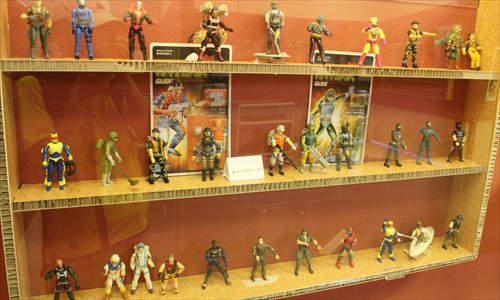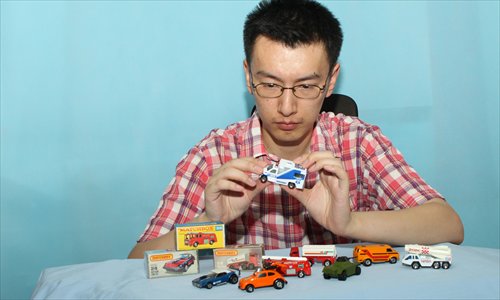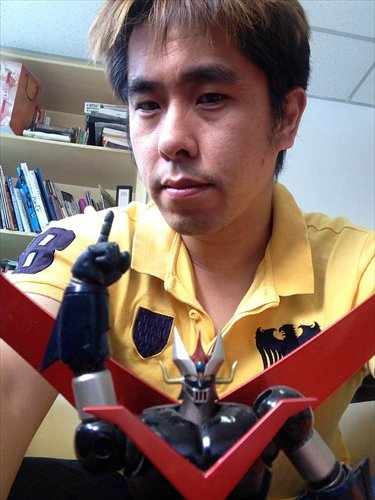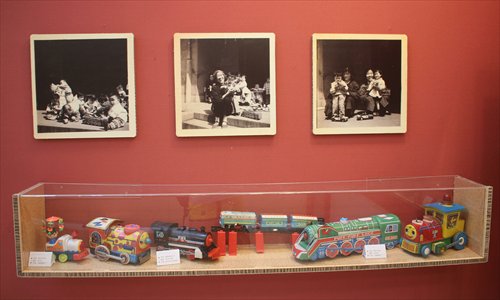Playing for keeps

Collectible action figures showcase models from the 1980s. Photo: CFP
Playing and collecting toys is not new in Shanghai - people have been doing this for hundreds of years. But on April 27 toy collecting in the city was formalized when the Toy Salon came into being, an organization formed under the Shanghai Collectors' Association and supported by the Shanghai Municipal Administration of Culture, Radio, Film & TV.
Before this many of the city's keen toy collectors had known each other for years and had become friends and contacts through online forums, exchanges and trades, and later, monthly get-togethers. Realizing they needed a more formal approach that would enhance their hobby, they decided to launch the Toy Salon.
Zhu Yuxiang is the head of the salon. "Collecting toys is no different from collecting antiques and paintings in that it preserves a part of the history of the city and of an era, and I believe it is important to have an organization that records and extracts the culture of toys," Zhu told the Global Times.
Though there are hundreds of thousands of toy collectors in the city (most of them informal) the salon has started with just 18 registered members. "They are capable of creating a snowball effect - many of them are administrators on online toy forums and they are in contact with a great many collectors and can invite them to join the salon."

Wang Fan looks over part of his Matchbox collection. Photo: Courtesy of Wang
An aging group
Most of the early members are in their late 20s or early 30s, quite unlike other collectors' organizations in which, according to the Shanghai Collectors' Association's director Wu Shaohua, the youngest members are in their sixties and most are in their seventies.
This is one reason why the Shanghai Collectors' Association has supported the formation of the Toy Salon. "The collectors' association is about to become a senior citizen's association as our collectors age, and it is increasingly difficult for them to take care of themselves, let alone their collections. In recent years we have been turning to younger people to help set up ways for them to collect, communicate, and connect," Wu said.
Zhu said Toy Salon members born in the 1960s and 1970s tended to collect tin toys while those born in the 1980s collected Transformers and Seed-Destiny (a Japanese anime series) models. The youngest members were interested in model trains.
Matchbox cars, the 1950s die cast model vehicles, were highly prized during the 1980s and still retain their popularity among members - both Zhu and Wang Fan, a 32-year-old computer hardware engineer, are Matchbox collectors.
Wang's fascination with Matchbox models started in his childhood when he was the proud owner of 10 or so cars - at that stage they were manufactured by the Shanghai Universal Toy Company (1984-2004). When Wang was 20, he happened upon a Shanghai Universal Toy Company shop one day and was immediately enchanted again by his old playthings. By talking to people who shared his enthusiasm and the staff at the shop, he started collecting seriously.

Taiwananese collector Hogan Liang with a Yoroiden Samurai Troopers model Photo: Courtesy of Liang
Lost memories
"My favorite childhood toy was a police car MB008 but unfortunately I lost it back then. I couldn't find the same model at the factory shop but after asking around, I eventually bought one from another collector for 40 yuan ($8). That has been my most memorable collecting experience," Wang said.
Today Wang has about 800 Matchbox models for which he has paid about 100,000 yuan over the years - the most expensive model he bought from a German collector for 1,300 yuan.
"Usually we set out to collect a defined range of items or set a goal for ourselves, for example collecting a certain series, otherwise it would be an infinite task and an impossible investment. My method is that I look up the catalogue of the series I intend to collect and then try to purchase items on taobao.com or through auctions on international websites," explained Wang.
Another salon member, Hogan Liang, is a Taiwan designer who has been working in Shanghai for the past eight years. He too collects Matchbox cars (he has about 400) and he started collecting models his father bought for him overseas.
"In those days it was rare for me to see real nice cars but those miniatures gave me beautiful dreams about the world out there. This is why though I have nearly 400 of them today, my favorites are still the earliest," Liang said.
Different patterns
Liang said the local and Taiwanese toy collecting scene was different in that the Taiwanese toys had a consistent and clear evolving timeline according to international trends in animation and media.
"But on the Chinese mainland, new and old cartoons were mixed together in the 1980s, and Transformers were dominant. As a result Chinese mainland collections reflect a concentration of popular tastes rather than a timeline.
"And Taiwan screens Japanese animation films or television shows usually within a year of their premiere - Yoroiden Samurai Troopers have become the most popular toy models there. But in China the show is broadcast only in a few southern provinces and very few fans are into collecting the models," Liang said.
He admitted that because of the gap in cultures, as the only Taiwananese member of the salon he sometimes had felt a bit lonely because the same toys could trigger very different emotional responses.
Nowadays the toy collecting scene is similar everywhere in the world. "Because of Hollywood films, Transformers, Iron Men and the like are big everywhere," Liang noted.

Members of Toy Salon and the Shanghai Collectors' Association get together on the official launch of the salon. Photo: Courtesy of Zhu Yuxiang
A Barbie bonus
Xiaoyun is the only woman in the salon and she collects Barbie dolls. Like Wang, the 29-year old also had a childhood flashback to encounter her childhood companions but she has collected at little cost. She has built her collection by exchanging dolls with other Barbie fans wanting to collect doll styles that she had spare versions of.
"These toys were new at first but as they grew older they became items of nostalgia. When they disappear from the shops they then have a higher value and evoke even more sentiment," Xiaoyun said.
She enjoys the salon. "In the past I was just engaged with the Barbie community, but at the salon I get to see what other collectors are doing with their particular items and learn about other toys. It has been a fun experience."
According to the founder, Zhu, there is a long membership waiting list at the moment but the salon is not rushing to expand. "We want to have a slow but steady development for the first few years, and we will invite other experienced collectors when we are well established."

A variety of model trains seen on display Photo: CFP
Going on show
The "development" of the Toy Salon will feature exhibitions, lectures and magazines. The salon will hold its first exhibition for two months from June 23 on the sixth floor of the Cangbao Lou antique markets near the City God Temple in Huangpu district, showcasing some of the members' collections. The Shanghai Collectors' Association is providing the venue.
The members will not just be showing off their collections but some will be demonstrating other talents. Wang, a keen photographer, will record the event and Xiaoyun, who works as an estate planner, will plan and organize the exhibition itself.
"The point of the exhibition is to show that, in the middle of this fast-paced and high-pressured setting, some young people are enjoying a fun lifestyle by collecting," Zhu said.
Some members will also give lectures later this year. Zhu said the lectures will include "stories behind cigarette cards" and "the evolution of Transformers."
The designer, Liang, will play a key role in the production of the first magazine for the salon. He hopes that the publications will bring more insight to toy collectors.
"We want it to be a regular publication and will ask academics and historians to explain things - like why tin toys disappeared and plastic toys replaced them.
"I think that effective communication is based on regular publications - for one thing, it will improve our communications with overseas collectors. I visited a private toy museum in Rome owned by a man in his eighties and he gave me several pieces he had published about toys after learning that I and others in Shanghai shared his interest. We can send our magazines to him and get to know what each is happening with toys in other parts of the world," Liang said.
He believed the Toy Salon and its activities would help record a new kind of history that was more intimate. "Before now people have thought of formal history as the only real history - for example the name of a president. However that sort of history doesn't necessarily belong to us, but we all know about toys. They contribute to everyone's personal history, and generations after us will know about our families through these toys."
Zhu said all the salon's events and even its publications would be free. Members are now working on the official website. "We are not just collecting toys but preserving culture and time, for these toys represent the quality of the craftsmen as well as the ideas behind the designs at certain periods," said Zhu.
Newspaper headline: Shanghai welcomes its first organization for toy collectors